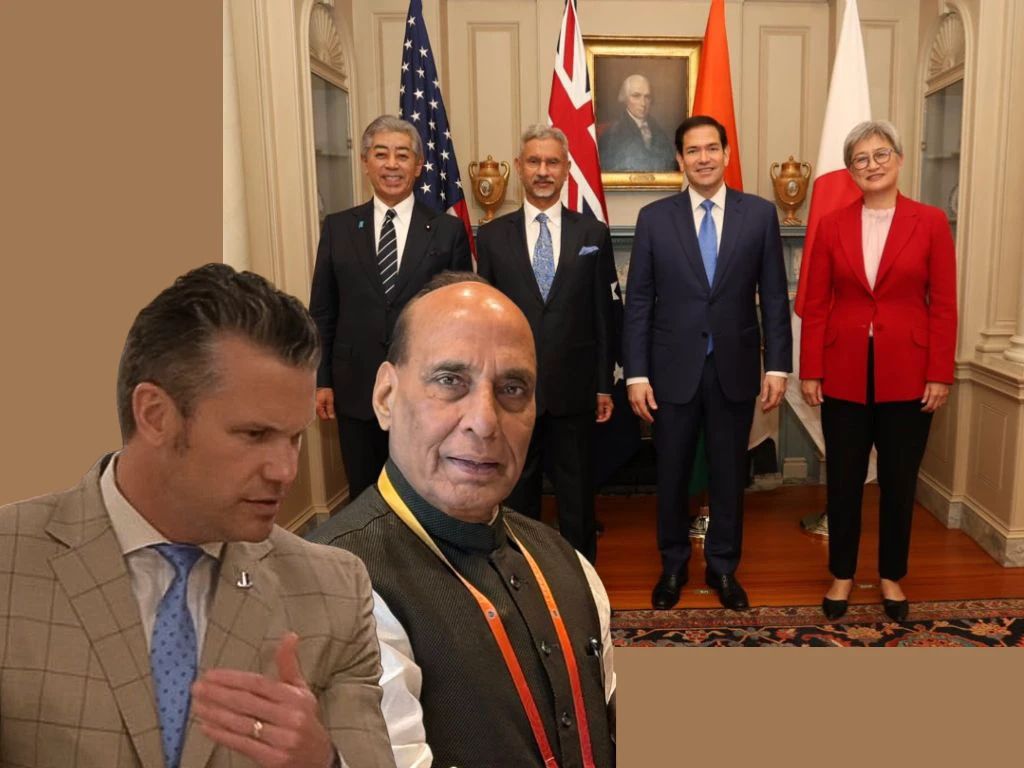New Delhi: The Quad group of countries on Tuesday (July 1) condemned the Pahalgam terror attack and called for its “perpetrators, organisers and financiers” to be “brought to justice”, but stopped short of naming Pakistan or explicitly calling for cooperation with the Indian government.
This was stated in a joint communiqué issued after the foreign ministers of the Quad – comprising India, the United States, Japan and Australia – met in Washington . The language closely followed the template of the issued in May, which had also avoided identifying the group responsible for the attack or making any direct reference to the Indian government.
The Quad joint statement said it “unequivocally condemns all acts of terrorism and violent extremism in all its forms and manifestations, including cross-border terrorism, and renews our commitment to counterterrorism cooperation”.
It went on to condemn “in the strongest terms the terrorist attack in Pahalgam, Jammu and Kashmir on April 22, 2025”, offered “deepest condolences to the families of the victims” and wished a speedy recovery to those injured.
“We call for the perpetrators, organisers and financiers of this reprehensible act to be brought to justice without any delay and urge all UN Member States, in accordance with their obligations under international law and relevant UNSCRs, to cooperate actively with all relevant authorities in this regard,” the statement said.
This sentence was nearly identical to the UNSC statement issued on May 25.
Diplomatic sources had said at the time that Pakistan, currently a non-permanent member of the Council and backed by China, had influenced the final language of the UNSC statement, which was originally drafted by the United States.
In a key shift from the UNSC’s 2019 statement after the Pulwama attack, the press statement on the Pahalgam terror attack omitted any mention of the Indian government, referring only to “relevant authorities” – an approach now mirrored by the Quad. The 2019 statement also mentioned the Pakistan-based terror group Jaish-e-Mohammed by name as being behind the Pulwama attack.
India has claimed that an offshoot of the Pakistan-based Lashkar-e-Tayyaba was behind the Pahalgam attack.
Two weeks after the incident, India launched drone and missile strikes on four sites inside Pakistan, targeting what it described as terrorist infrastructure. Pakistan retaliated, leading to four days of military exchanges that ended after US President Donald Trump announced a ceasefire.
While Trump claimed credit for brokering the ceasefire, India later stated there had been no formal agreement but only a temporary cessation of hostilities following a phone call between the Indian and Pakistani military leaderships. Meanwhile, Pakistan’s standing in Washington appeared to improve, with army chief Field Marshal Asim Munir receiving an unprecedented lunch invitation from Trump.
The Narendra Modi government has since faced domestic criticism from opposition parties for failing to garner international support to name or isolate Pakistan. There was also concern in New Delhi that Trump’s public framing of the situation had ‘re-hyphenated’ India and Pakistan. In the days following the clashes, India dispatched multiple all-party delegations of MPs to foreign capitals to make the case for Pakistan’s alleged terror links.
‘India has every right…’: Jaishankar
,external affairs minister S. Jaishankar said India expected its partners to recognise its right to defend itself against terrorism.
“A word about terrorism in the light of our recent experience,” he said, referring to the Pahalgam attack. “The world must display zero tolerance. Victims and perpetrators must never be equated.”
“India has every right to defend its people against terrorism, and we will exercise that right. We expect our Quad partners to understand and appreciate that,” he added.
The latest July 1 Quad statement also does not include language that had previously figured in both the July 2024 foreign ministers’ joint statement issued in Tokyo and the September 2024 leaders’ joint statement from Wilmington. Those earlier declarations had explicitly named past terror attacks, such as 26/11 in Mumbai and the 2016 Pathankot airbase attack, and called for action against UN-listed terrorist groups, including the Lashkar-e-Tayyaba and the Jaish-e-Mohammed.
No ‘Pakistan-sponsored terrorism’
In a separate development, India’s own messaging on Pakistan had also been muddled.
The Ministry of Defence removed all references to “Pakistan-sponsored terrorism” from its official readout on defence minister Rajnath Singh’s call with US Secretary of Defence Pete Hegseth on Tuesday. The , which was also carried by state media Doordarshan, affirmed India’s right to launch strikes inside Pakistan and Pakistan-Occupied Kashmir under “Operation Sindoor” and declared, “Pakistan’s long track record of cross-border terrorism is well known globally. It has become a safe haven for internationally banned terrorists who enjoy immunity there.”
However, after minutes of its release, the ministry issued a revised version that dropped all references to “Pakistan-sponsored terrorism.”
